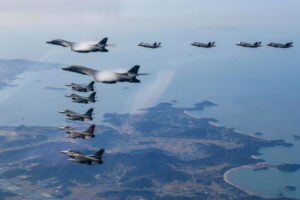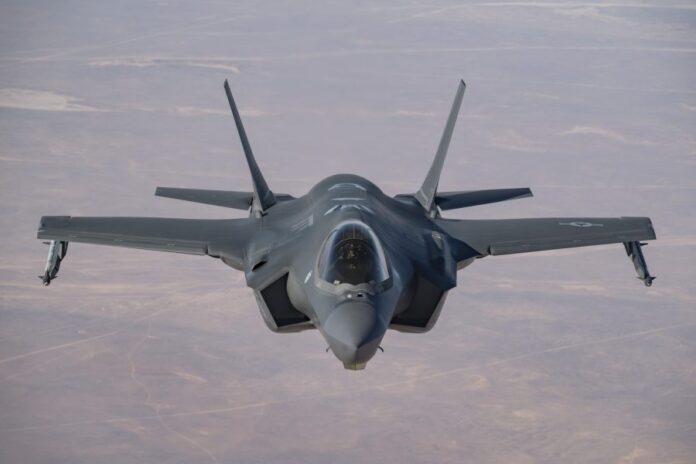In the dynamic realm of international geopolitics and military affairs, strategic maneuvers and choices can generate unease on a global scale. A noteworthy development that has drawn the interest of political commentators, military specialists, and the general public in recent times is the United States’ delivery of F-35 fighter planes equipped with nuclear weapons to the United Kingdom. This audacious approach has not been ignored, especially by Russia, which has responded to this development with a combination of caution, strategic response, and alarm.

The F-35: Revolutionizing Military Aviation
Prior to discussing Russia’s response to this transfer, it is critical to comprehend the significance and power of the F-35 fighter aircraft. The fifth-generation multi-role stealth aircraft, known for its cutting-edge technology and adaptability, is the Lockheed Martin-developed F-35 Lightning II. It is a game-changer in military aviation because of its powerful mix of cutting-edge sensors, situational awareness, and stealth skills.
Because of its versatility, the F-35 can perform well in a variety of tasks, including ground support, air-to-air combat, and reconnaissance. It is a powerful nuclear-capable asset in addition to being a fierce fighter, thanks to its stealth qualities and cutting-edge avionics.
Conclusions and Significance of the Transfer
The strategic choice to relocate American F-35s equipped with nuclear weapons to the United Kingdom has far-reaching effects. It makes it quite evident that the United States is dedicated to strengthening its connection with the United Kingdom, a NATO ally. By taking this action, the UK is able to better defend itself against changing international threats.
Deterrence is significantly impacted by the transfer as well. NATO strengthens its deterrent capabilities by stationing these nuclear-capable aircraft in the United Kingdom and sends a clear message to prospective enemies that aggression will be met with a prompt and forceful reaction.
Russia’s F-35 Fighter Response: A Blend of Alertness and Worry
Russia, which has often disagreed with the West and NATO, keeps a careful eye on events taking place in the European theater. It seems sense that Moscow would be concerned about the delivery of F-35s equipped with nuclear weapons to the UK.
1. **Increased Tensions:** The region’s tensions are heightened by the US F-35s with nuclear weapons stationed in the UK. Russia sees this action as a direct threat to its security and interests.
2. **Crucial Reaction:** Russia has been forced to bolster its own military capabilities and presence in the European theater in reaction to this trend. This include strengthening its naval presence in the Baltic and Black Seas, conducting military drills, and improving its air defense systems.
3. **Tactful Posturing:** In addition to its military operations, Russia has made diplomatic concessions, highlighting the need of strategic stability and weapons control. Moscow has continuously urged communication to address the escalating worries in the area.
4. **Enhanced Monitoring:** Additionally, Russia has increased its oversight of NATO operations, keeping a careful eye on the deployment and travel of F-35s and other military equipment around Europe.
The Broader Implications
The deployment of US F-35s equipped with nuclear weapons to the UK has wider ramifications for worldwide security and world politics than just the immediate responses.
1. **Unity of NATO:** By doing this, NATO members are demonstrating their commitment to one another and to one another in a strong show of solidarity. It emphasizes NATO’s commitment to defending its constituent nations.
2. **Control of Arms:** The circumstances underscore the significance of weapons control accords and discourse among major states. Discussions on strategic stability are becoming more and more important.
3. **A Change in Geopolitics:** The transfer of these cutting-edge fighter planes signals a change in Europe’s power dynamics. It emphasizes how crucial it is to keep the balance of power in place in order to avoid disputes.
4. **International Safety:** We are reminded of the interconnectivity of international security by the deployment of nuclear-capable F-35s in the UK. Repercussions from actions taken in one region of the globe might extend far beyond that region.
In Conclusion
The supply of US F-35 fighter aircraft with nuclear capacity to the UK, particularly from Russia, has set off a complex web of reactions. This strategic maneuver has caused tensions to rise, alertness to grow, and diplomatic attempts to be made in response to the worries it has created. This development highlights the significance of strategic stability and communication and has wider ramifications for geopolitics and international security.





